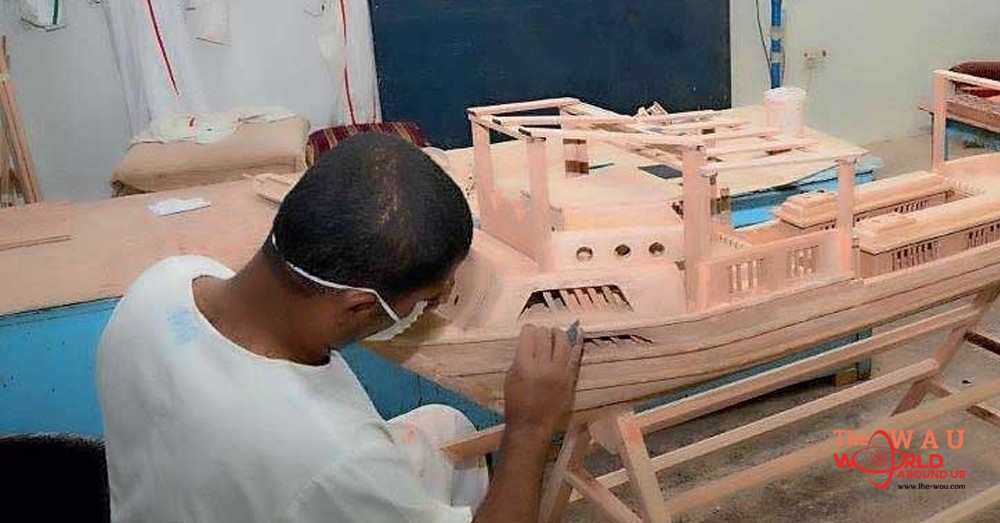Approximately, 1,800 Pakistani prisoners are in UAE jails for various crimes, ranging from financial frauds to serious crimes.
When Aqsa Aslam started a social media campaign to have her brother released from a jail in Dubai in March, the case garnered a lot of attention. The case was also listed on Pakistan Prime Minister's complaint portal from where it was forwarded to the Dubai mission for action.
According to Aqsa, her brother Zeeshan Aslam, 37, had been in a jail in Dubai for over five years. "He has already completed his jail term but was not being released," she said. However, that is not the case.
Zeeshan had been accused and subsequently punished for using forged documents to make a credit card and upon using the card, he was arrested. "My mother is ill and wants to meet him at least once in her life," said Aqsa. "My father passed away three years ago because of this tragedy," added Aqsa. However, that is not the entire story.
The true story
Zeeshan will actually finish his jail term in 2020. An appeal has been made to the jail authorities and he could have been among the 572 Pakistani prisoners pardoned by the UAE Rulers during the holy month of Ramadan.
Approximately, 1,800 Pakistani prisoners are in UAE jails for various crimes, ranging from financial frauds to serious crimes, of which 25 are women.
Last month, Pakistan's Foreign Office spokesperson Muhammed Faisal had said that 572 prisoners were being released in Ramadan and would be celebrating Eid with their families. The break up given was Abu Dhabi/Al Ain (262), Dubai (177), Sharjah (52), Ajman (65) and Fujairah (16).
"Contrary to what is projected in the media, the number of Pakistanis in the UAE jails is not huge," said Ahmed Amjad Ali, Pakistan's Consul-General (CG) to Dubai.
While the type of crimes range from minor to serious, many of them are still in jails even after having completed their jail terms because financial cases against them are pending.
"They could have been jailed for fraud and even could have completed their jail terms, but unless the money (in financial fraud cases) is paid back, they will not be deported. They will have to stay in jail," said Ahmed.
"A huge misconception many of the prisoners have is that once they have completed their jail terms, they'll be deported," he added.
But this is obviously not the case. "If they have defaulted on money, especially with financial institutions, they have to pay back even after completing the jail terms. If not, they'll have to seek an out of court settlement," he said.
In some cases, prisoners owe even as little as Dh5,000 to Dh9,000. "But until this amount is paid, there is no way out."
However, the amounts can be reduced through negotiations with the relevant authorities.
"We had a case where a man on a wheelchair owed a hospital Dh400,000 but after negotiations, the hospital reduced it to Dh100,000 which he expected the consulate to pay," said Ahmed.
In such cases, the prisoners expect the embassy, consulate or any of the Pakistani associations to raise funds and pay up the fines for them.
Help from envoy
The Pakistani mission has limited funds under its Community Welfare Fund, said the CG, and most of these funds are used to help destitute cases, repatriate dead bodies and also pay for tickets for those cases.
"We have written to the Pakistan government to help pay the fines or these prisoners or help facilitate their release and of course this depends on the crimes and the amount," said Ahmed.
The funds are also given as Ramadan and as Eid packages in the form of calling cards or cash so that they can get in touch with their families back home.
The vetting process for cases that do not have identification documents is long and time consuming. "We have to check the nationality of people who claim to be Pakistanis in cases where identity documents are lost or destroyed because Pakistanis, Indians and Bangladeshis look similar," he said.
The national status verification is then carried out by the National Database and Registration Authority (Nadra) by verifying the provided address in Pakistan which could take up to four months.
However, even despite the fact that any families can neither bear the cost of living in the UAE nor educate their children, many of them are reluctant to move back to Pakistan.
"We tell them that this situation could lead to crime and create further problems," he said.
Community association
Similarly, members of the welfare committee of the Pakistan Association Dubai (PAD) met officials at the Dubai Central Jail in Al Awir and paid for air tickets and minor fines of around 100 Pakistani prisoners.
Rizwan Fancy, director of community welfare at PAD, said: "The initiative is part of our annual Ramadan campaign 'release a prisoner', according to which we announced within our community that community members could donate Dh750 for each prisoner on an average. Last year, we managed to help release 76 prisoners and this year we aim to help release around 200 prisoners."
However, PAD does not help prisoners involved in criminal cases but only those serving sentences for minor offences such as working on wrong visa, being listed in absconding list. Help is extended to those who could be released after paying small fines and the prisoners who needed tickets to travel back home, he adds.
"The 100 prisoners - mostly men - who will be released shortly is the first batch and we are now aiming to get 100 more prisoners released. Our first priority is Pakistanis, and after helping our compatriots, we will try to help release some women prisoners of other nationalities, too," he said.
Despite the desire to help, the mission and association are unable to in a number of cases. "The fine amounts are too high. We do not have these kind of funds," says Fancy.
The association is a registered charity body and gets its fund as donations from the community. "We easily spend Dh80,000 in a month in handling cases such as body repatriations and in helping between 15-17 people weekly," he adds.
'With business crisis began all troubles'
A failing business, non-payments and bounced cheques were the start of all problems for S.S. The Pakistani expat is now out on bail after having been slapped with 19 cases of bounced cheques by six banks on a loan of Dh2.4 million in addition to late payment fines of Dh175,000.
"Most things were not in my hands," he told Khaleej Times. "My payments were stuck in the market and there was no way out so I went over and presented myself for arrest," he said.
He spent three years in Dubai and Sharjah jails from 2016 until 2018.
"I had to send my family back home to Pakistan because of these issues," he said, adding that he can't leave the country since his travel documents are still with the authorities.
He said that banks are insured so the losses they face are recovered. "If it is a fraud case, then the fines have to be paid back but in cases of failed businesses, there is leniency," he explained.
"After being in jail for so long, it is not possible to pay the accumulated fines and even Dh210 for a clearance certificate from the police," said S.S.
"I want to request Pakistan authorities to look into cases like mine since even after having completed my jail term, I have no money and I am living hand to mouth," he said.
Legal understanding
Ashish Mehta, founder and managing partner of Ashish Mehta and Associates, said that in cases of financial irregularities or criminal cases, there was a possibility of a travel ban.
"It might not be possible for the person to travel out of the country even after having completed the jail term because there is a travel ban imposed," he said. "Banks can file these cases in court after which the bans are imposed."
He explained that the solution could be seeking an out of court settlement with the financial organisation.
Share This Post















